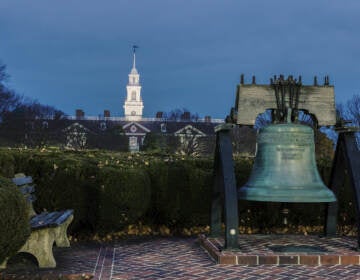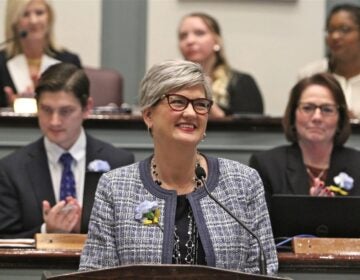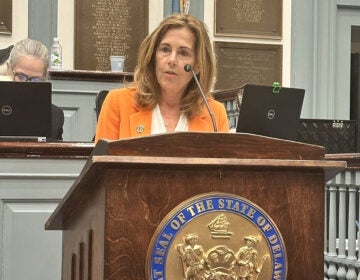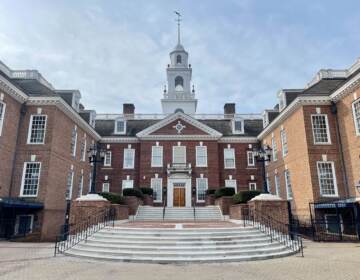‘Right to know’: Progressives hope next Delaware governor will push for more government transparency
Open government advocates say a new governor and potentially more progressive lawmakers would provide a unique opportunity for more transparency.
Listen 1:02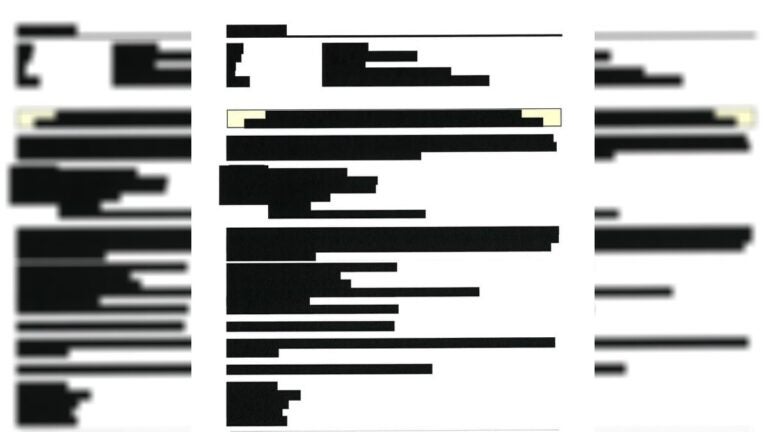
This completely redacted email was sent to WHYY News in response to a FOIA request involving the Christina School District. Some open government advocates hope a new administration in Dover will make lawmakers' activities more transparent.
From Philly and the Pa. suburbs to South Jersey and Delaware, what would you like WHYY News to cover? Let us know!
This story was supported by a statehouse coverage grant from the Corporation for Public Broadcasting.
November’s election could bring more sunlight to Delaware’s state government. Open government advocates said they expect lawmakers to take up changes to the state’s Freedom of Information Act with the support of a new administration.
About a decade ago, Delaware got an “F” for government accountability and ethics. Since then, little has been done to improve the system. Recent scandals involving government cover-ups of missing taxpayer funds and campaign finance violations have advocates ready to see change.
“I am really optimistic and hopeful that issues concerning transparency, and just concerning ethics in government, can and will be front and center this coming session,” said Steve Tanzer, political news blogger for delawareliberal.net. He’s been campaigning for progressive House candidates.
Advocates hope the new administration voters elect next month will support significant changes they’ve been clamoring for over several years. That includes reducing exemptions where documents can be withheld from the public or narrowing how agencies apply them, overhauling the police bill of rights and making legislators’ emails subject to public view.
Law Enforcement Bill of Rights
Outgoing Gov. John Carney signed legislation last year that made a number of changes to the Law Enforcement Bill of Rights, known as LEOBOR. The statute prevented the public from examining police disciplinary records. The legislation requires the state to release the names of officers who violate certain rules, along with the narrative of the incidents. The actions that warrant an investigation of an officer include use of force causing serious injury, discharging a firearm at a person, sexual assault, dishonesty and domestic violence.
However, the bill was a watered-down version of the measure introduced by state Sen. Elizabeth “Tizzy” Lockman (D-Wilmington) in 2021 and was lambasted by reform advocates as lacking meaningful transparency.
Democratic gubernatorial candidate Matt Meyer said he supports absolute transparency in policing and would assess if more needed to be done beyond last year’s legislation, if elected governor.
“You can’t have a system where a small group of police officers and former police officers evaluate police officer conduct,” he said. “The general public needs to have the right to evaluate police officer conduct.”
Republican gubernatorial candidate Mike Ramone, who previously served as House minority leader, voted for the 2023 legislation. While not addressing specifics about the issue, he said his biggest focus is on how he’s “not going to let woke, left- or right-wing extreme thoughts and political positions affect how we do and what we do.”
State lawmakers’ emails
Both candidates for governor are also pledging to improve transparency in state government.
The FOIA applies to public bodies and requires access to documents and meetings unless they fall under one of 19 exemptions. State lawmakers decided in 2009, under an effort headed by retiring state representative and former House Speaker Pete Schwartzkopf, to exempt their emails and those of their staff from disclosure.
Claire Synder-Hall, former executive director of Common Cause Delaware, is running for Schwartzkopf’s vacant seat against Republican Mike Simpler. For five years, Snyder-Hall headed the nonprofit organization devoted to principals including government accountability and transparency. She said if elected, she would be in favor of her emails being open to the public.
“You think about people looking at emails, and it’s a little unnerving,” she said. “But I don’t think that it’s that onerous for legislators to expect that the emails they’re sending over the state system would be subject to FOIA.”
Executive privilege
The governor’s office has what the Delaware Attorney General’s Office has recognized in state law as “executive privilege.”
Gov. Carney has used it in the past, for example to redact correspondence regarding the moving of the Rodney Square bus terminal in 2018. The documents were heavily redacted. Delaware Coalition for Open Government spokesman John Flaherty, who requested the emails, appealed the censorship to the AG’s office, but it decided the governor’s emails could stay private.
Meyer said as governor, he would want to give government employees and elected officials space to communicate freely without “everything showing up on the front page in the newspaper.” But he said the public also has the right to know if there are any backdoor deals happening.
“I think there are situations now where the public’s not getting access to information and emails they should have a right to access,” he said.
If elected governor, Meyer said he supports the release of his emails in certain circumstances. However, he would want to protect attorney-client communication, which is a current FOIA exemption.
Ramone said he is worried that overzealously opening up lawmakers’ emails might expose coalition building intended to help people. But he said he supported the public being able to see what a lawmaker is emailing about as it pertains to specific bills.
“What it may end up resulting in is a very closed email opportunity for constituent service, and that’s very nerve-wracking to me,” he said. “If a constituent feels that they have to be protective or fearful of asking for help or sending an email, that gets very complex.”
19 exemptions
There are 19 exemptions that Delaware government agencies and public entities can use to withhold documents from the public. Those include criminal records, investigative files and autopsy records. That means police reports, inmate causes of death and restitution paid to victims are excluded from public disclosure.
When an exclusive WHYY News report revealed in May that a former state worker stole more than $181,000 in federal and state taxpayer funds last year, Delaware State Police denied a request for the police report, despite it closing its investigation that August. Former unemployment insurance administrator Michael Brittingham had also been convicted of stealing from his homeowners association during his employment with the state Department of Labor, but the Delaware Superior Court denied WHYY News’ request to get the amount of any restitution he paid back to his victims.
WHYY News also reported in July that former Democratic gubernatorial candidate Lt. Gov. Bethany Hall-Long’s campaign requested Elections Commissioner Anthony Albence keep a report concluding she repeatedly broke campaign finance law confidential as an “investigative file” despite being informed that it was subject to the FOIA. In emails obtained through the FOIA, Albence told Hall-Long he did not “intend to publicly post or release this report” unless he received an open records request.
“That is definitely an appearance of impropriety,” Flaherty said. “If you’re a subject of investigation, you should not be lobbying to have incriminating documents kept from the public view.”
Ramone said he’s seen FOIA requests be delayed or slow-walked, but said he’s not implying it’s being done on purpose. He said there’s also a problem with people taking advantage of the FOIA process and making large numbers of requests.
“I’m here to make sure the process is fair, open, equitable and safe,” he said. “I believe the more we can open the doors, we should continue to open them until the point that they’re not fair, they’re not equitable and they’re not safe.”
Meyer said he would direct his administration to review the exemptions to make sure they’re not being misused.
“I can think of situations where we would want some FOIA protections, or for situations under investigation,” he said. “But I think it’s being too often used today to withhold information that the public has a right to know.”
Both gubernatorial candidates said they supported more transparency around lobbyists and disclosure requirements. Both also support the creation of an Inspector General Office to investigate waste, fraud and abuse. State Sen. Laura Sturgeon sponsored legislation on that earlier this year, but it died in committee.

Get daily updates from WHYY News!
WHYY is your source for fact-based, in-depth journalism and information. As a nonprofit organization, we rely on financial support from readers like you. Please give today.



